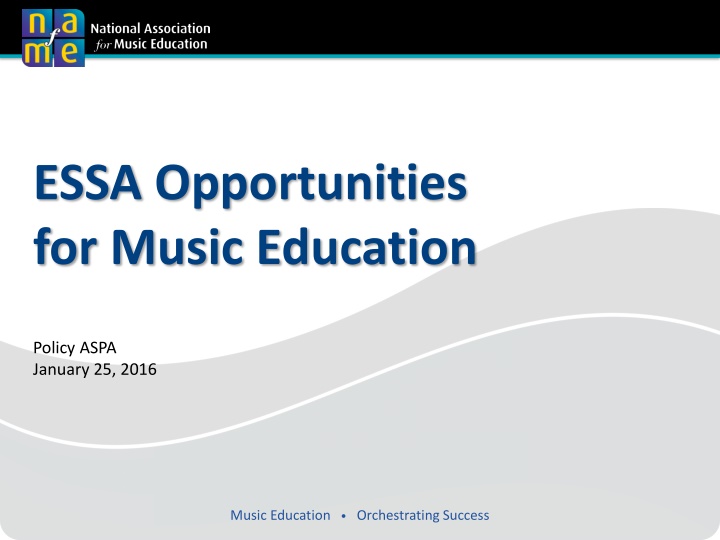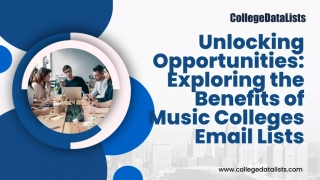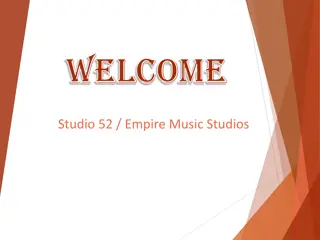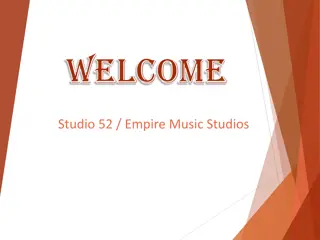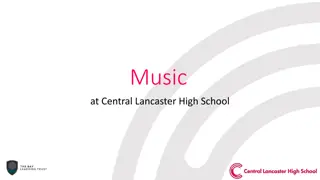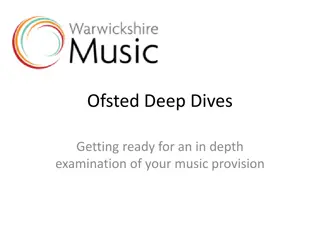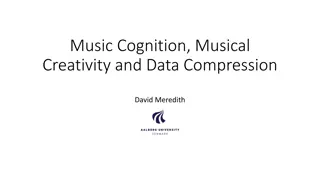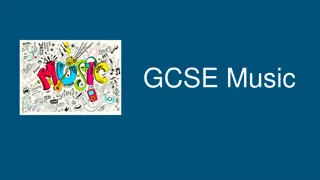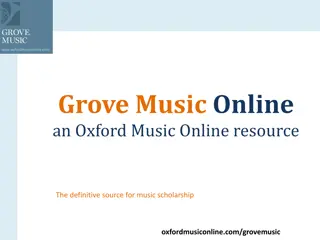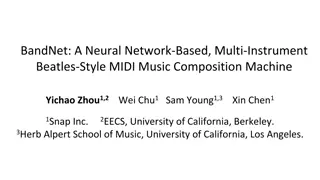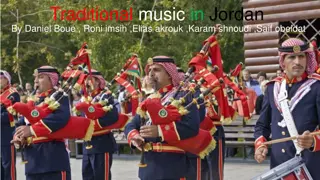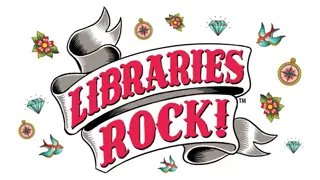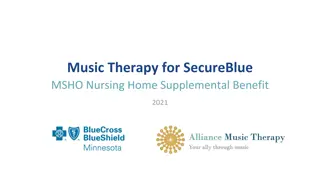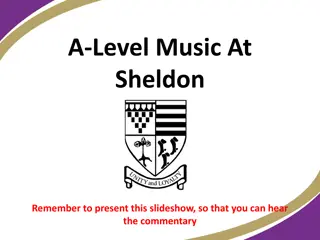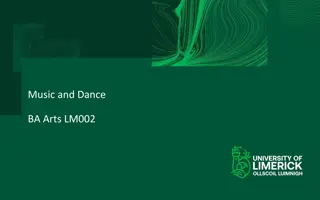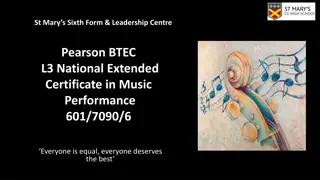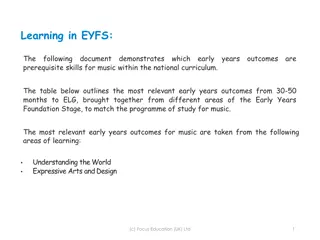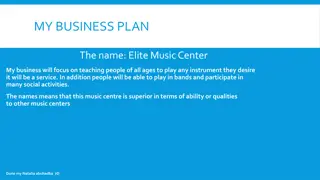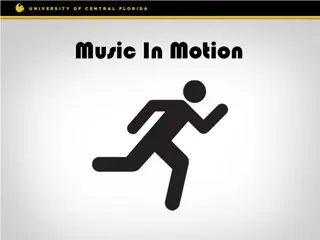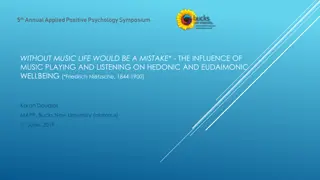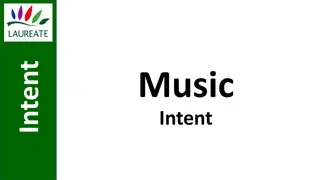Music Education Opportunities in Education Policy
This document discusses the opportunities and requirements for music education within the Education policy framework, focusing on the Every Student Succeeds Act (ESSA). It emphasizes the importance of music as a well-rounded subject and outlines how Title I and Title IV funds can be utilized to support and enhance music education programs in schools.
Uploaded on Sep 12, 2024 | 3 Views
Download Presentation

Please find below an Image/Link to download the presentation.
The content on the website is provided AS IS for your information and personal use only. It may not be sold, licensed, or shared on other websites without obtaining consent from the author.If you encounter any issues during the download, it is possible that the publisher has removed the file from their server.
You are allowed to download the files provided on this website for personal or commercial use, subject to the condition that they are used lawfully. All files are the property of their respective owners.
The content on the website is provided AS IS for your information and personal use only. It may not be sold, licensed, or shared on other websites without obtaining consent from the author.
E N D
Presentation Transcript
ESSA Opportunities for Music Education Policy ASPA January 25, 2016 Music Education Orchestrating Success
1. A New and Clear Intent to Support Our Nations Schools through a Well-Rounded Education 1965 ESEA -Title I Financial Assistance to Local Education Agencies for the Education of Children of Low Income Families 1981 ESEA Title I - Financial Assistance to Meet Special Educational Needs of Children 1994 ESEA Title I -Helping Children in Need Meet High Standards 2001 ESEA (NCLB) Title I Improving the Academic Achievement of the Disadvantaged 2015 ESSA Title I - Improving Basic Programs Operated by State and Local Educational Agencies Music Education Orchestrating Success
2. Enumeration of Music as a Well-Rounded Subject Title VIII, Section 8002 - Definitions (52) WELL-ROUNDED EDUCATION. The term well-rounded education means courses, activities, and programming in subjects such as English, reading or language arts, writing, science, technology, engineering, mathematics, foreign languages, civics and government, economics, arts, history, geography, computer science, music, career and technical education, health, physical education, and any other subject, as determined by the State or local educational agency, with the purpose of providing all students access to an enriched curriculum and educational experience. Music Education Orchestrating Success
3. Requirements for Well-Rounded Education Title IV: 21st Century Schools Section 4107 Assess LEA and School Needs for Well-Rounded Education including Music Education Evaluate if the needs were met and/or changes are needed Plan to address any areas needing support including Music Education Apply for Title IV funds to provide support including for Music Education Implement changes utilizing Title IV funds Music Education Orchestrating Success
4. Flexibility of Title I Funds to Support a Well-Rounded Education Section 1008 Schoolwide Title I Schools (Poverty > 40%) Section 1009 Targeted Assistance Title I Schools Targeted programming for identified students at academic risk, which may include: Music as part of whole school reform, including not just academic achievement but school culture/climate using resources under this part to help eligible children meet the challenging State academic standards, which may include programs, activities, and academic courses necessary to provide a well-rounded education which can include music Each Schoolwide school is encouraged to include activities in support of a well-rounded education in its schoolwide plan, which includes music Music Education Orchestrating Success
5. More Professional Development for Music Educators Funds from Titles I, II and IV of ESSA, may support professional development for music educators as part of a well-rounded education. Part of opportunities in 3 chapters of ESSA Will music educators be included equitably? Music Education Orchestrating Success
6. Flexible Accountability Systems States choose multiple progress measures for schools Music education-friendly measures such as student engagement, parental engagement and school culture/climate can be chosen AYP Music Education Orchestrating Success
7. Protection from Pull Outs The new ESSA discourages removing students from the classroom, including music and arts, for remedial instruction. Section 1009 (Targeted Assistance Programs) - (ii) minimize the removal of children from the regular classroom during regular school hours for instruction provided under this part Music Education Orchestrating Success
Additional Change to note No HQT ESSA does NOT contain a highly- qualified teacher definition or requirement. The law does state, however, that teachers need to meet the credentials set forth by their state AND should have academic content knowledge for the content they teach if they are funded by ESSA. Music Education Orchestrating Success
Questions received from Policy ASPA Music Education Orchestrating Success
1. Which legislator(s) specifically added music as a separately enumerated subject in the early senate drafts? Who later developed the "well-rounded language" provisions? 2013: Current HELP Chairman Alexander's staff originally added music as a "Core Academic Subject" in earlier iteration of ESEA revision 2015: The "Well-Rounded Education" language was developed, in a bipartisan fashion, by staff working on behalf of the conference committee members Music Education Orchestrating Success
2. Are the other arts areas frustrated at our being separately enumerated? NAfME remains in close contact with the other arts discipline service organizations. NAfME has shared its implementation materials with our colleagues; EdTA has made use of our Implementation Toolkit - https://www.schooltheatre.org/advocacy/guidetoessa A DAMT meeting is scheduled for March looking ahead to the next reauthorization as well as implementation implications under ESSA. NAfME remains committed to working with our colleagues in all the arts education areas in K-12 education; however, our mission is to support music education. Music Education Orchestrating Success
3. Education secretaries like Rod Paige and Arne Duncan have both written letters in the past clarifying that Title I funds can/should be used for arts education, but it still doesn't really seem (at least anecdotally) to happen in a significant way. Does this spending occur? Does NAfME plan to urge this? Yes, the spending occurs -- but not nearly enough NAfME has already created several new tools to help educators and other advocates get familiar with the process of tapping into these funds. We are also pursuing additional guidance language, dear Colleague letters, national conference opportunities and more with the U.S. Department of Education to try and make the process even easier. Music Education Orchestrating Success
4. Not really a question, but a hope. I'd love to see NAfME turn its attention to petitioning and lobbying states to strengthen arts policies such as elem/MS mandates, grad requirements, adoption of standards, adoption of "core" subject language, etc. I know NAfME is reticent to jump into state matters, but we all know this is where the battle is (much more than at the federal level). Any thoughts? 1. 2. An area of great interest to NAfME focus, staffing, etc. We have created the Advocacy Leadership Force or ALF for this kind of work building capacity and creating tools Meets monthly (virtually) 40 states currently signed on Sharing tools, resources and best practices across the states in terms of advocacy Music Education Orchestrating Success
5. Is the little bit of STEAM language really something NAfME should be celebrating? All of the research I've done on STEAM shows that music is almost never part of STEAM schools/curricula (it's almost exclusively visual art/design). Would NAfME consider putting out a position statement on STEAM (we had discussed this with Alexandra Eaton at some point), referencing the SEADAE roles paper and/or the definitions of arts integration that integrate sequential instruction into any successful integration set-up? 1. NAfME has concerns about STEAM Current amended language in law is fine but nothing to celebrate Need to think about a position statement perhaps Shared Endeavor and the SEADAE roles paper do enough? 2. Music Education Orchestrating Success
Stay in touch www.bit.ly/NCLBends Visit the NAfME website under Everything ESSA to stay up to date on materials, toolkits and resources you can use to better understand and engage with this new federal law. Lynn Tuttle and Chris Woodside lynnt@nafme.org ChrisW@nafme.org Music Education Orchestrating Success
